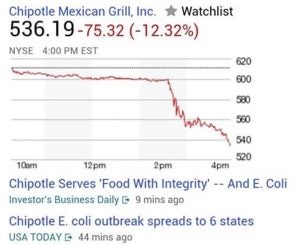Have agriculture advocates won the battle over GMOs?
It’s a wonderful and attention-grabbing concept, but the short answer is no, and we definitely shouldn’t take our foot off the gas when it comes to science and agricultural communication. We have, however, made significant progress on public perception with regards to understanding the importance of genetically engineered crops in our modern food system. No longer are those who are against GMOs as loud or “in your face” as they used to be. So what happened?
It appears that the non-GMO food industry and many big organic brands have shot themselves in the foot in recent years. Take Chipotle for example. After the fast-food chain announced their “non-GMO” stance back in 2015, an insane amount of backlash ensued. Chipotle became tied up with lawsuits, partly because they still sourced sodas made with GMO corn syrup and the livestock for their meat were still fed GMOs. If you ate at Chipotle between April 27, 2015, and June 30, 2016, you may be entitled to compensation. (Learn more about this and the $6.5 million class-action settlement here.)
This is barely scratching the surface on the horrible things Chipotle has done to the farming community over the years. This is also a reflection of their stock after they made the anti-GMO announcement — and many of the subsequent years have been spent doing damage control over this, not to mention being weighed down by an abysmal food-safety record.

Chipotle has not done many negative ads in the past couple years (though the 2021 Super Bowl ad was pretty laughable) and part of that is probably due to their hiring of a new chief marketing officer in 2018, coming off a year when Chipotle’s stock lost almost a quarter of its value. It’s hard not to wonder if the decision to make anti-GMO claims in 2015 hurt their business and led to the new leadership, as society began to show a growing acceptance of biotechnology and advances in agriculture.
Chipotle is only one major example. Brands such as Hunt’s, Dannon, Nature’s Path, CLIF bar, Organic Valley, Panera, Stonyfield, and more have also received major backlash for anti-GMO and anti-science marketing efforts. I’d say Stonyfield takes the cake as the world’s worst food company, and their terrible ad campaign in early 2018 that exploited children against biotechnology marked the beginning of the end for the anti-GMO movement on social media.

Scientists turned against Stonyfield for falsifying facts, the public turned against them for exploiting children, organic farmers were upset at how their farming methods were portrayed, Facebook users turned against them for deleting comments by the thousands, and the social media trends and hashtags #silencedbystonyfield #bannedbystonyfield and “The Banned Consumer” Facebook groups all went viral. Within a week’s time, Stonyfield essentially scorched any momentum that the anti-GMO movement had built over the previous decade.
Even Stonyfield’s half-hearted follow-up post on Facebook to acknowledge train wreck, many of the hundreds of comments highlighted the harm Stonyfield has done to its business and how ineffective it is for the organic food company to link to sites such as the Environmental Working Group or Just Label It in its replies, as those are well-documented anti-biotech activist organizations and not credible scientific sources. (Stonyfield also played a major role in funding anti-GMO and anti-Monsanto propaganda films like Food, Inc., which does not tell a truthful story about agriculture whatsoever.)
But that brings up another longtime favorite boogeyman of anti-GMO activism: Monsanto. It’s almost hard to start discussing the amount of misinformation that has enveloped this biotech company, but overall, a vast majority of farmers will tell you that Monsanto was not this terrible company that Stonyfield and others would have liked for you to believe. But it’s all in the past, isn’t it? Monsanto no longer exists, as the company was purchased by Bayer in 2018.
This has effectively ended the March Against Monsanto (MAM) movement, and their original Facebook page is shut down as well. There are still a few groups and activists out there, but if you look at how much their movement has decreased, you see a significant trend in the fact that more people are catching on: GMOs aren’t the devil. The counter protest to MAM — March against Myths about Modification (MAMYTHS) — also played a big role in dissipating their movement while challenging MAM’s very misinformed views on biotechnology.
The GMO advocacy movement has continued to get louder, while online engagement and overall negativity surrounding the topic has significantly died down a lot from what it was, say, five or 10 years ago. People have found new trends to become heated and angry about in food — the heavy debates are moreso around regeneration, sustainability, and environmental topics surrounding livestock, methane, and fake meat.
Wait, fake meat? Isn’t this full of chemicals, preservatives, biotechnology, grown in a laboratory? Well now, isn’t that funny. Has this — or will it continue to shift — the messaging and feelings toward our food? Is this hiding the biotechnology conversation or suggesting that having genetic engineering in what we eat is a non-issue?
It seems as if this is the area where people’s views on food have indeed shifted. Once again, the companies behind the anti-meat narrative are driving sales on their plant-based alternatives. And the similarities in the marketing approaches of the anti-GMO and anti-meat movements are alarmingly similar. Bottom line? Fear sells. Or so they think, until more people catch on to the fact that no, livestock aren’t destroying the planet. It’s the hot topic for right now, but will the plant-based movement die down in the next five or 10 years, just like the anti-GMO movement has done? Probably, especially considering that most vegans and vegetarians go back to eating meat after only a year — and some, even much faster.
And down the road, the public will find something else new to be outraged about … which is generally all based on media hyperbole and whatever food problem is trending (which may or may not even be a real issue).
The speculation and trends is something that the meat industry can learn a lot from and be more proactive instead of reactive to protect their industry. What’s happened with the loud anti-GMO movement could be forecasting for vegan animal-rights activists and the fake meat crowd. It’s fine to have different opinions and choices about what to eat, but don’t spread misinformation in the process. It isn’t a good long-term strategy.
The food trends that are truly “sustainable?” Qualities that a vast majority of consumers really care about is that it’s cheap, it tastes good, and it’s safe to consume. So while we realize that loud extremists are a minority, we must continue to share our stories with the truth about agriculture and once again, never take our foot off the gas with advocating for how our food is produced.
It’s nice to see the anti-GMO movement slow down a bit where science may prevail. This article talks about the money trail behind their misinformed movement, but these special interest groups have certainly started to realize that lies and slander against their competitors will get them nowhere in the long run. May science continue to be heard in its humanitarian efforts.
Michelle Miller, the Farm Babe, is a farmer, public speaker and writer who has worked for years with row crops, beef cattle, and sheep. She believes education is key in bridging the gap between farmers and consumers.



